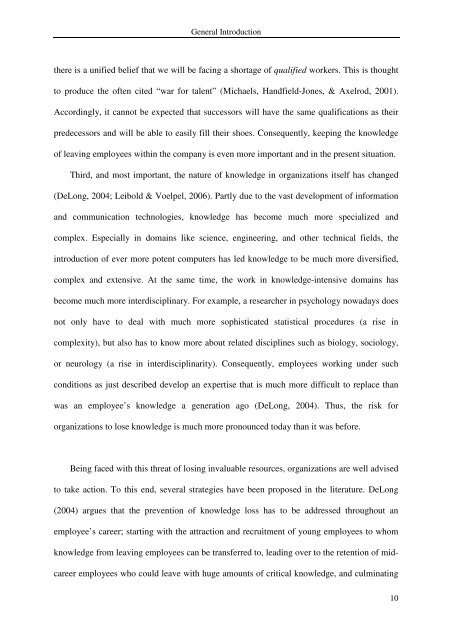thesis_Daniela Noethen_print final - Jacobs University
thesis_Daniela Noethen_print final - Jacobs University
thesis_Daniela Noethen_print final - Jacobs University
Create successful ePaper yourself
Turn your PDF publications into a flip-book with our unique Google optimized e-Paper software.
General Introduction<br />
there is a unified belief that we will be facing a shortage of qualified workers. This is thought<br />
to produce the often cited “war for talent” (Michaels, Handfield-Jones, & Axelrod, 2001).<br />
Accordingly, it cannot be expected that successors will have the same qualifications as their<br />
predecessors and will be able to easily fill their shoes. Consequently, keeping the knowledge<br />
of leaving employees within the company is even more important and in the present situation.<br />
Third, and most important, the nature of knowledge in organizations itself has changed<br />
(DeLong, 2004; Leibold & Voelpel, 2006). Partly due to the vast development of information<br />
and communication technologies, knowledge has become much more specialized and<br />
complex. Especially in domains like science, engineering, and other technical fields, the<br />
introduction of ever more potent computers has led knowledge to be much more diversified,<br />
complex and extensive. At the same time, the work in knowledge-intensive domains has<br />
become much more interdisciplinary. For example, a researcher in psychology nowadays does<br />
not only have to deal with much more sophisticated statistical procedures (a rise in<br />
complexity), but also has to know more about related disciplines such as biology, sociology,<br />
or neurology (a rise in interdisciplinarity). Consequently, employees working under such<br />
conditions as just described develop an expertise that is much more difficult to replace than<br />
was an employee’s knowledge a generation ago (DeLong, 2004). Thus, the risk for<br />
organizations to lose knowledge is much more pronounced today than it was before.<br />
Being faced with this threat of losing invaluable resources, organizations are well advised<br />
to take action. To this end, several strategies have been proposed in the literature. DeLong<br />
(2004) argues that the prevention of knowledge loss has to be addressed throughout an<br />
employee’s career; starting with the attraction and recruitment of young employees to whom<br />
knowledge from leaving employees can be transferred to, leading over to the retention of midcareer<br />
employees who could leave with huge amounts of critical knowledge, and culminating<br />
10

















